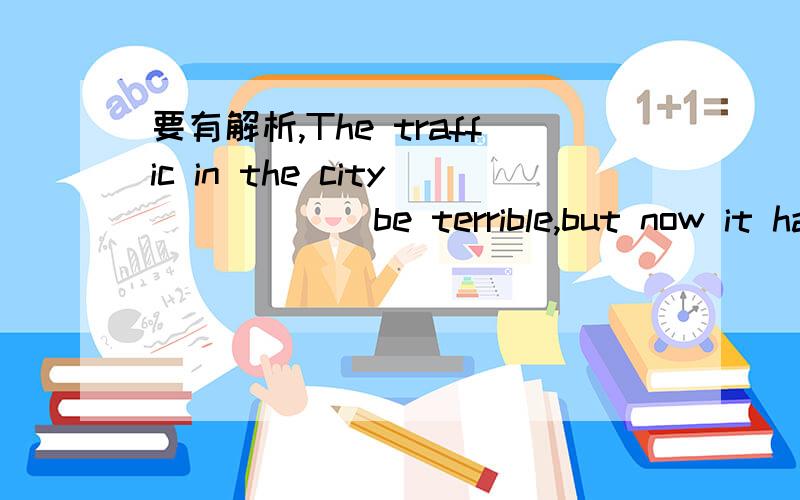要有解析,The traffic in the city _____ be terrible,but now it has improved a lotThe traffic inthe city _____ be terrible,but now it has improved a lot.I think you will_____ it soon.A.use to; use to B.getused to; used toC.used to; get used to D.ge
来源:学生作业帮助网 编辑:作业帮 时间:2024/04/28 00:01:49

要有解析,The traffic in the city _____ be terrible,but now it has improved a lotThe traffic inthe city _____ be terrible,but now it has improved a lot.I think you will_____ it soon.A.use to; use to B.getused to; used toC.used to; get used to D.ge
要有解析,The traffic in the city _____ be terrible,but now it has improved a lot
The traffic inthe city _____ be terrible,but now it has improved a lot.I think you will_____ it soon.
A.use to; use to B.getused to; used to
C.used to; get used to D.getused to; use to
要有解析,The traffic in the city _____ be terrible,but now it has improved a lotThe traffic inthe city _____ be terrible,but now it has improved a lot.I think you will_____ it soon.A.use to; use to B.getused to; used toC.used to; get used to D.ge
此题选C
前一空填used to,后一空填get used to
依次考used to do sth(过去常常做某事)和get used to (doing sth)(习惯于做某事)这两个句型
句子翻译是:这个城市的交通过去常常很糟糕,但是现在好了很多,我认为你会很快适应的
一道初中英语题,要有解析,The traffic in the city _____ be terrible, but now it has improved alotThe traffic inthe city _____ be terrible, but now it has improved a lot. I think you will_____ it soon.
A.use to...
全部展开
一道初中英语题,要有解析,The traffic in the city _____ be terrible, but now it has improved alotThe traffic inthe city _____ be terrible, but now it has improved a lot. I think you will_____ it soon.
A.use to; use to B.getused to; used to
C.used to; get used to D.getused to; use to
选C
A已经错了、
use时态比对。没有一个符合的BD
B.getused to; used
D.getused to; use to
后加doing 也错了
so...选C
收起
C
used to do 过去常常
used to 说的专业点,是个半助动词,
助动词后面要加动词原形的
get used to 习惯...
这里的to是介词,后面跟名词